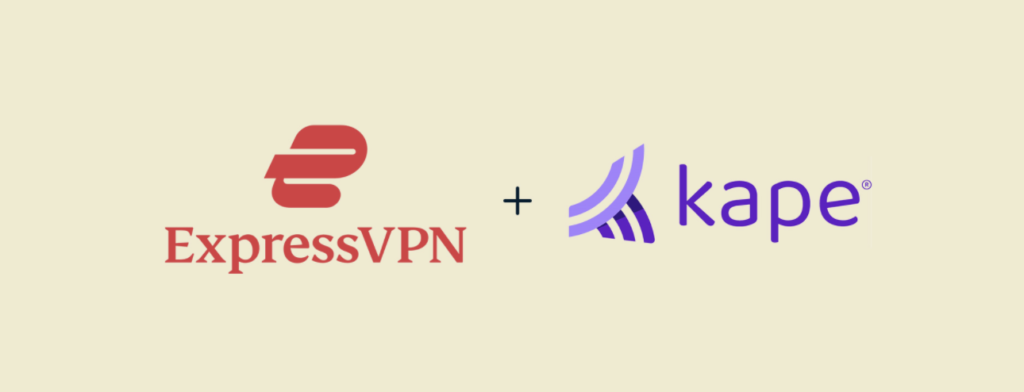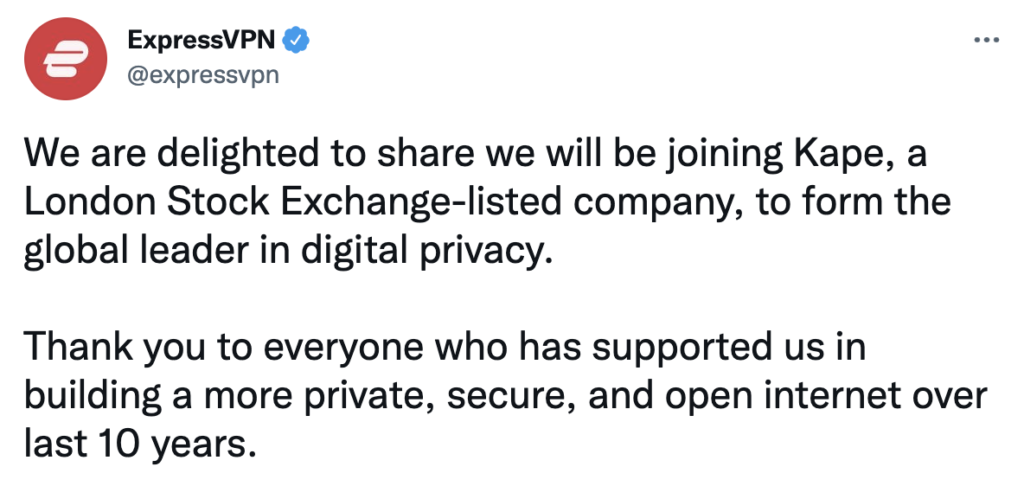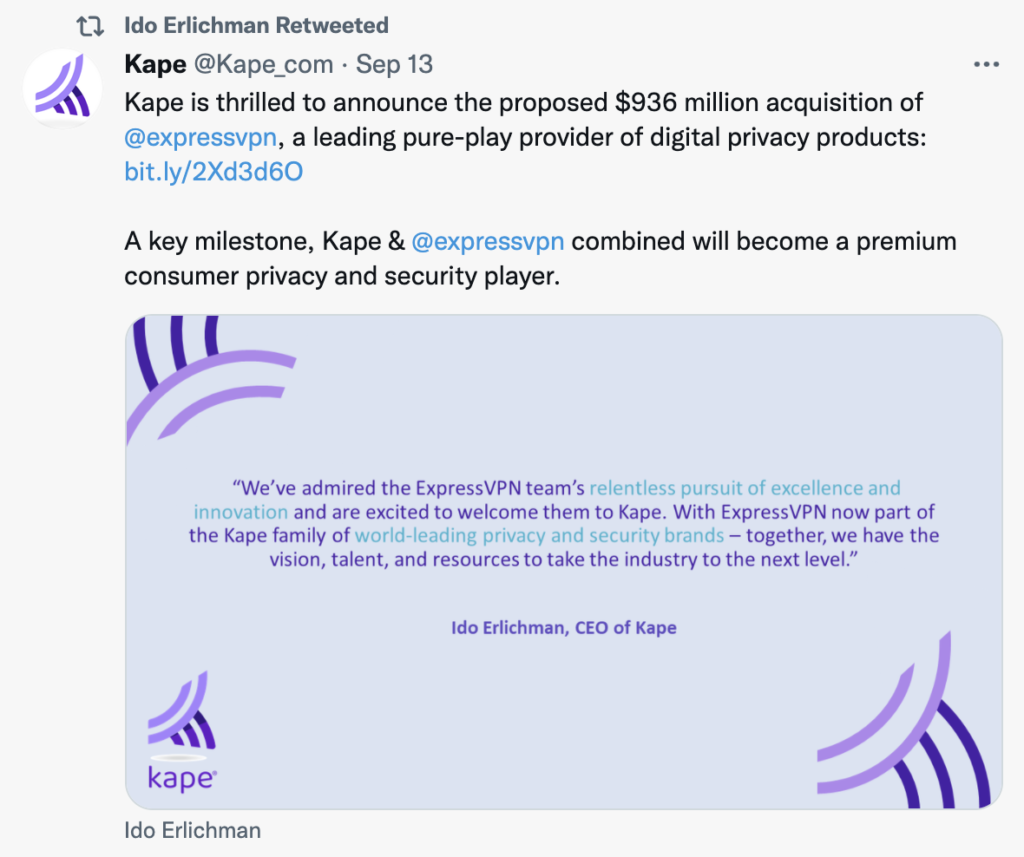October 18, 2021
50 VPN Statistics & Key Trends [2022]
This year alone, VPN usage has increased drastically, many services have vastly improved, and the [...]

WHAT’S IN THIS REVIEW?
Disclaimer: Partnerships & affiliate links help us create better content. Learn how.
ExpressVPN is one of the more popular VPN providers on the market, which gives some explanation as to why it has been sold to software giant Kape Technologies as part of a massive $936 million deal announced earlier this week.
It’s the latest in a variety of moves made by Kape to position themselves at the forefront of online security. It’s one more acquisition to tighten their stranglehold over the industry. Here’s what all parties have to say, along with our take on what it could mean for ExpressVPN users in the long term.
UK-based Kape Technologies was formerly known as Crossrider until a name change in 2018. Formerly headquartered in Israel, Crossrider became synonymous with adware as the company “previously allowed third-party developers to hijack users’ browsers via malware injection while redirecting traffic to advertisers and collecting private data.”
Since then, it’s undergone a rebranding and complete overhaul of its Crossrider C-Suite employees to usher in a new era of privacy-focused members.
At the time of its rebranding, Kape said: “The Company’s change in name reflects the transformation of its operations and the shift in strategic focus that has taken place over the last eighteen months. The Company’s aim is to become the leading provider of products that ensure consumers’ online security, privacy, and autonomy.”
For the most part, they’ve fulfilled that promise. Today, Kape has major offices in many cities across the globe, including its London HQ, Bucharest, Denver, Manila, Paris, and Tel Aviv. And in such a short time, they’ve made a number of impressive moves as they aim to consolidate their share of the market and make further gains within the sector.
Kape Technologies is no stranger to VPN acquisitions, having built a robust suite of well-known and trusted VPN services over the last few years. Existing Kape Technologies VPNs include:
Kape Technologies is a major player in the VPN industry. They’ve thrown money at a number of competing providers, now reaching an overall user base of 6 million. They began by purchasing CyberGhost in 2017 for $10.5 million and went on to acquire Zenmate VPN a year later for a fee of approximately $5.6 million. Then, their VPN stable was boosted by the popular Private Internet Access (PIA). Kape bought PIA for $127.6 million in cash and shares in late 2019. They also purchased Webselenese in March 2021 for $149.1 million in cash and shares. (Webselenese runs the review site vpnMentor.)
This leads us to the midway point of September 2021, and the news that they have purchased arguably the biggest and most recognizable VPN service on the market in the form of ExpressVPN. The acquisition cost almost $1 billion, showing just how serious Kape is when it comes to controlling the online security sector.
It’s also worth noting that the size and scale of their purchases have increased exponentially over the years. PIA sold for over 10 times as much as CyberGhost. ExpressVPN sold for just over 89 times the CyberGhost fee and 7.5 times the amount spent on PIA. It’s a testament to how highly they rate ExpressVPN, which must be seen as the jewel in their crown now.

In its company announcement, ExpressVPN expressed that it will “join Kape to strengthen [a] push for privacy,” which is one interpretation of the buyout. Arguably, they were made an offer that was too good to refuse.
Kape will gain access to the ExpressVPN user base of roughly 3 million people. It’s mentioned that the service boasts a “compound annual growth rate (CAGR) of 35.1% over the past four years amid strong demand for consumer-friendly data privacy and security products.”
In other words, ExpressVPN is highly profitable. A lot of that can be attributed to the huge increase in connectivity due to worldwide lockdowns. It’s a service that’s just taking off, which likely makes it a viable investment for Kape Technologies long-term.

Formed in 2009, ExpressVPN has been at the forefront of the industry in terms of marketing. Not to mention, they offer great speeds and a capable server network. They’ve grown into one of the largest VPNs in recent years, developing the Lightway protocol and creating TrustedServer.
ExpressVPN released a blog post where they discussed the Kape purchase, including the following statement:
“We’ve been impressed by Kape’s clear commitment to protecting the privacy of users. Their track record with upholding the exacting privacy practices and policies of other privacy protection services under the Kape umbrella is a strong testament to how seriously they take their responsibility to respect user privacy and rights.”
This is fair, given PIA has seen no issues in the two years since being purchased by Kape, along with committing to being a no-logs provider. The same can be said for CyberGhost who hasn’t been involved in any notable controversies. Although, the service is surely due for another audit. Its last one was completed back in 2012 when Kape didn’t exist.
The Kape umbrella mentioned in their statement is getting larger each year, and they’re obviously not afraid to buy out key competitors.

Kape Technologies CEO Ido Erlichman released the following statement after news of the acquisition broke:
“We’ve admired the ExpressVPN team’s relentless pursuit of excellence and innovation and are excited to welcome them to Kape. With ExpressVPN now part of the Kape family of world-leading privacy and security brands – together, we have the vision, talent, and resources to take the industry to the next level. Controlling one’s digital presence is at the forefront of every tech consumer’s mind now, and Kape is more committed than ever to innovating and delivering the tools Internet users need to protect their data and rights. Kape is now synonymous with taking control of your digital experience.”
The last sentence is a bit foreboding, but they’re obviously happy to have cornered a significant section of the market.
Both parties note the advantages of the merger, stressing that core ExpressVPN features will remain in place. Namely, the company will remain independent, while being able to rely on the increased resources offered by Kape.
Considering it was a deal worth a staggering $936 million in cash and shares, it’s worth reiterating that ExpressVPN would have been fine regardless. It’s tough to judge whether the deal will have an impact on the average ExpressVPN user, as Kape has promised autonomy in the future. However, you don’t need me to point out why this has the potential to go awry. Now that Kape controls a significant portion of the VPN market, competing interests are self-evident.
There’s potential for homogenization, which is easy to spot when looking at PIA and ZenMate side by side. For example, PIA allows for a choice between one-month, one-year, or three-year subscriptions. ZenMate has the exact same plan selection. PIA has servers in 78 countries, while ZenMate Ultimate offers “79+” per its website.
In their defense, it’s worth noting that CyberGhost has remained independent as promised. It offers both different subscriptions and more servers than the VPNs mentioned above.
Overall, with ExpressVPN now joining its ranks, Kape supports over 6 million paying subscribers and has a global team of over 720 employees.
In an ideal world, VPNs would be wholly independent, rather than being linked to each other by a common owner. CyberGhost, Zenmate VPN, and Private Internet Access are solid providers, but they’re dwarfed in scale and popularity by ExpressVPN. After all, Kape has doubled user numbers following this single acquisition.
Even if they have their user’s best interests at heart, Kape now controls numerous services in direct competition with one another. Not to mention, their new, shiniest toy is one of the biggest VPNs on the market. There’s also the fact that they own a VPN review website (vpnMentor), which means they could influence the discourse surrounding their own services.
For what it’s worth, Kape makes no attempts to hide its treasure trove of VPNs and consistently seeks out independent audits of all of its services to maintain transparency with users.
If you’d prefer an independently-owned provider, options like NordVPN or ProtonVPN tick many boxes and are well worth checking out.

Learn more about ExpressVPN with our analysis.
| Cookie | Duration | Description |
|---|---|---|
| __cfduid | 1 month | The cookie is used by cdn services like CloudFlare to identify individual clients behind a shared IP address and apply security settings on a per-client basis. It does not correspond to any user ID in the web application and does not store any personally identifiable information. |
| cookielawinfo-checkbox-advertisement | 1 year | The cookie is set by GDPR cookie consent to record the user consent for the cookies in the category "Advertisement". |
| cookielawinfo-checkbox-analytics | 1 year | This cookies is set by GDPR Cookie Consent WordPress Plugin. The cookie is used to remember the user consent for the cookies under the category "Analytics". |
| cookielawinfo-checkbox-necessary | 1 year | This cookie is set by GDPR Cookie Consent plugin. The cookies is used to store the user consent for the cookies in the category "Necessary". |
| cookielawinfo-checkbox-non-necessary | 1 year | This cookie is set by GDPR Cookie Consent plugin. The cookies is used to store the user consent for the cookies in the category "Non-necessary". |
| cookielawinfo-checkbox-performance | 1 year | This cookie is set by GDPR Cookie Consent plugin. The cookie is used to store the user consent for the cookies in the category "Performance". |
| viewed_cookie_policy | 1 year | The cookie is set by the GDPR Cookie Consent plugin and is used to store whether or not user has consented to the use of cookies. It does not store any personal data. |
| Cookie | Duration | Description |
|---|---|---|
| cookielawinfo-checkbox-functional | 1 year | The cookie is set by GDPR cookie consent to record the user consent for the cookies in the category "Functional". |
| cookielawinfo-checkbox-others | 1 year | No description |